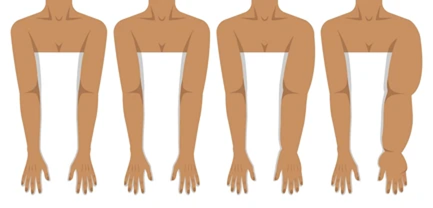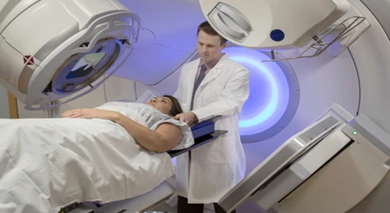Have you ever wondered about the odds of getting breast cancer at age 40? Let’s take a look at it!!
Overview
The chance of breast cancer at 40 increases compared to younger ages, although it remains relatively lower than in older age groups, particularly between 50 and 70 years old.
‘’Breast cancer is more common in older women, but can still sometimes affect younger women.
Early detection is necessary as younger women may have the more aggressive form of breast cancer. Regular screenings, self-exams, and being aware of risk factors are important for early detection and effective treatment,’’ explains Dr. Donald John Babu, an expert oncologist for breast cancer treatment in Navi Mumbai.
Breast cancer at the age of 40 can be challenging, but an oncologist can provide crucial support and personalized treatment.
Let’s dive into the statistics and understand the reality of breast cancer during 40s.
How common is breast cancer at 40?
Breast cancer at the age of 40 isn’t rare. Studies show that about 1 in every 69 women under the age of 45 develop breast cancers, this includes those at 40. So, it’s important to stay aware and prioritize screenings and self-checks for early detection.
Stay vigilant and schedule a consultation with an oncologist today!! Their expert treatment plans and compassionate care can do miracles.
Surviving breast cancer in your 40s is more than just a possibility—it’s a reality for many. Let’s explore the numbers.
Breast cancer at 40 survival rate

Breast cancer at 40 survival rates are pretty good! About 89% of women diagnosed with breast cancer at this age survive for at least five years after diagnosis. The chance of survival can change depending on factors like the stage of cancer, how aggressive it is, and how well treatments work.
Getting regular check-ups and catching any issues early is super important. So, if you’re in your 40s, make sure to keep an eye on your breast health, get your screenings done, and don’t hesitate to see a doctor if something seems off.
For tailored treatment plans visit a cancer specialist soon!!
What puts you at risk for breast cancer development at 40? Let’s find out.
Causes and risk factors of breast cancer development at 40
Breast cancer during 40s can stem from a mix of factors, like genetics, lifestyle, and hormones.
- Around 5% to 7% of cases are linked to inherited gene mutations, such as BRCA1 and BRCA2.
- Being overweight or obese increases the risk by 30% to 60%.
- Regular alcohol intake can up the risk by 10%.
- Hormonal factors, like early periods or late menopause, can spike the risk by 12% to 60%.
- Sedentary habits and past chest radiation, especially before 30, also play a part.
Being aware of these factors can help lower your risk.
What does the future hold for those with breast cancer in their 40s? Let’s explore.
Breast cancer in 40s prognosis
Breast cancer in 40s prognosis can vary. Early detection and treatment can significantly improve outcomes. According to the American Cancer Society, the 5-year survival rate for localized breast cancer is about 99% when caught early. However, if the cancer has spread, the prognosis may be less favorable.
Regular screenings and paying attention to changes in your breast health are key. Stay proactive and seek medical help promptly if needed.
Know your body and recognize the signs. Let’s talk about the symptoms of breast cancer when you are 40.
Symptoms of breast cancer at 40

Keeping an eye on your breast health at 40 is super important. Here are some symptoms you should be aware of:
- Appearance of a lump in the breast or armpit
- A part of the breast swells or thickens
- Skin irritation or dimpling in the breast
- The breast or nipple skin becomes red or flaky
- Nipple changes, such as pulling in or pain.
- Unusual discharge from the nipples, including blood
- Breast shape or size changes
- Pain in breast
These symptoms don’t always mean cancer, but it’s good to discuss with your doctor if you notice anything unusual. Regular checks and mammograms are key for catching any issues early.
Beyond the diagnosis, what challenges can breast cancer bring when you are 40? Let’s discuss.
Complications of breast cancer at 40

Breast cancer complications at 40 can include:
Lymphedema: Swelling in the arm due to lymph node removal or damage.
Bone weakness: The risk of fractures increases if cancer spreads to the bones.
Chemotherapy and radiation side effects: Fatigue and nausea are common.
Emotional challenges: Anxiety and depression may arise.
Regular check-ups and support from healthcare providers can help manage these complications effectively.
Facing complications from breast cancer? You don’t need to face them alone!! An expert oncologist can provide the support and care that you need. Book your consultation today!
Taking on breast cancer at age 40 requires a comprehensive approach. Let’s explore the treatment options.
Treatment and management

Treating and managing breast cancer at the earliest is super important for better outcomes. Treatments for breast cancer include:
- Surgery removes the cancerous tumor.
- Chemotherapy kills cancer cells throughout the body.
- Radiation therapy eliminates any leftover cancer cells after surgery.
- Hormone therapy blocks hormones that can fuel cancer growth.
- Targeted therapy might be used for specific types of breast cancer.
Regular check-ups help monitor for any signs of cancer coming back. Eating well and staying active can also help.
Prevention is key. Let’s uncover the steps you can take to lower your risk of breast cancer at an older age.
How to prevent breast cancer at 40?
Breast cancer prevention at 40 is all about being proactive. Here are some simple steps you can take:
- Stay at a Healthy Weight: Aim for regular exercise and a balanced diet. It can reduce your breast cancer risk by up to 30%.
- Limit Alcohol: Try to stick to no more than one drink per day. Too much alcohol can increase your risk.
- Quit Smoking: Smoking increases your chances of breast cancer development at 40, so kick the habit if you can.
- Check Yourself: Do regular self-exams and get mammograms as your doctor advises. Mammograms can cut your risk by 40%.
- Know Your Family History: If breast cancer runs in your family, talk to your doctor about early or more frequent screening.
- Consider Breastfeeding: It can lower your risk by up to 4.3%.
- Stay Updated: Keep an eye on the latest research and guidelines. Being informed helps you make the best choices for your health.
By making these small changes, you can see the risk of breast cancer reducing.
Empower yourself with knowledge and take steps for breast cancer prevention at 40.
Final Note:
Being aware of the increased risk of breast cancer at age 40 is important. Regular screenings and consultations with healthcare providers like Dr. Donald John Babu, an esteemed oncologist in Navi Mumbai, are essential for early detection and personalized care. Empowering yourself with knowledge and proactive health measures can greatly impact breast health and overall wellness.
Taking proactive steps in treating and managing breast cancer in the 40s is crucial. Only an oncologist can help you out! Get in touch with them today. Ensure you are on the path to better health.
FAQs
Q1. What is the chance of getting breast cancer at the age 40?
Ans. About 1 in every 69 women are at risk of developing breast cancer in 40s.
Q2. Is breast cancer during the 40s hereditary?
Ans. About 5-10% of breast cancers are hereditary, often linked to BRCA1 or BRCA2 gene mutations.
Q3. What treatments are available at 40 for breast cancer?
Ans. Treatments include surgery, chemotherapy, radiation, hormone therapy, and targeted therapy.
Q4. What lifestyle changes can reduce the breast cancer risk at 40?
Ans. Maintaining a healthy weight, regular exercise, limiting alcohol, and not smoking can lower the risk.
Q5. What types of breast cancer can one be diagnosed at 40?
At the age of 40, common types of breast cancer include ductal carcinoma in situ (DCIS), invasive ductal carcinoma (IDC), invasive lobular carcinoma (ILC), triple-negative breast cancer, HER2-positive breast cancer, inflammatory breast cancer (IBC), and Paget’s disease of the nipple.
Q6. How to diagnose breast cancer at 40?
Diagnosis of breast cancer at 40 typically involves a combination of mammograms, clinical breast exams, breast ultrasounds, and sometimes breast MRI, followed by biopsy to confirm the presence of cancer cells. Early detection is crucial for effective treatment and improved outcomes.

